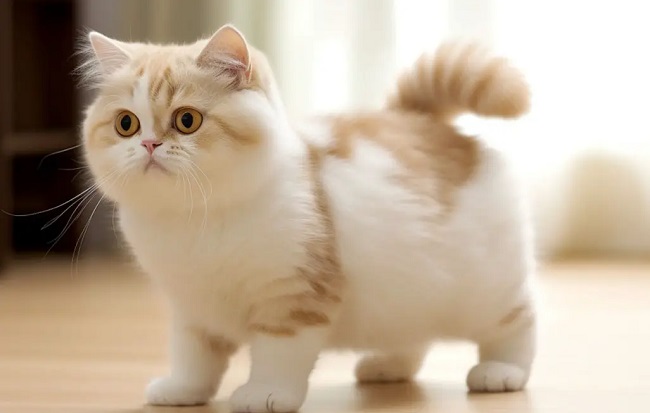In the diverse world of feline breeds, short-legged cats have carved out a special niche for themselves. These small but mighty felines may have shorter limbs, but their personalities are anything but diminutive.
This article delves into the various short-legged cat breeds, their distinct traits, and essential care tips for these unique pets.

Short Legged Cat Breeds
Here are some of the short-legged breed cats:
Read Also:
Munchkin Cat
Munchkin cats, known as the ‘Dachshunds of the Cat World’, are the most famous short-legged feline breed.
Their short stature is due to a naturally occurring genetic mutation, but this does not hinder their agility or playful spirit. Munchkins are known for their sociable, outgoing nature and intelligence.
Skookum Cat
The Skookum cat breed is a cross between a Munchkin cat and a LaPerm cat. The result is a small, curly-haired, short-legged breed that is both playful and affectionate.
Bambino Cat
Bambinos are a hybrid of Munchkin cats and Sphynx cats. This results in a hairless, short-legged cat with a playful and energetic disposition.
Lambkin Cat
Lambkin cats, resulting from a cross between Munchkin cats and Selkirk Rex cats, sport curly fur and short legs. They are friendly, sociable, and great companions.
Napoleon Cat (Minuet Cat)
Named after Napoleon Bonaparte due to its short stature, this breed is a cross between a Munchkin cat and a Persian cat. Napoleon cats boast the plush coats of Persian cats along with the short legs of Munchkin cats. They are known for their calm and gentle nature.
Caring for Short-Legged Cats
Though they are generally healthy, short-legged cats may require specific care due to their unique body structure.
Regular Check-ups
Regular veterinary check-ups are essential for all cats, including short-legged breeds. Regular monitoring can help catch and address any potential health issues early.
Weight Management
Keeping your cat at a healthy weight is crucial. Due to their short legs, extra weight can lead to stress on their spine and other health complications.
Proper Nutrition
Providing a balanced diet for your short-legged cat is key to keeping them healthy. Consult with your vet to understand the nutritional needs specific to your cat’s breed and age.
Regular Exercise
Short-legged cats are typically active and playful. Regular playtime and exercise help keep these cats physically fit and mentally stimulated.
Are Short-Legged Cats Right for You?
Short-legged cats can make excellent pets, bringing joy and companionship to their owners. They are generally friendly, playful, and adjust well to various living conditions. However, they may require a little more attention regarding their health due to their unique physique.
The Genetics of Short-Legged Cats
Short-legged cats owe their unique stature to a genetic mutation that affects the development of the long bones in their legs.
This mutation, in a gene known as fibroblast growth factor 4 (FGF4), is inherited in an autosomal dominant fashion.
This means that even if a kitten only inherits the gene from one parent, they will still have the short-legged trait.
Ethical Considerations and Controversies
There has been considerable debate in the cat breeding community about the ethics of breeding short-legged cats. Critics argue that the deliberate breeding for short legs can lead to health problems, including spinal issues and bone deformities.
However, proponents maintain that with responsible breeding practices, these risks can be minimized and that short-legged breeds do not inherently suffer from more health problems than other breeds.
Health Considerations for Short-Legged Cats
While generally healthy, some short-legged cats can be prone to lordosis (a condition where the spine dips down towards the body) and pectus excavatum (a condition where the chest wall caves in). Regular veterinary checks can help in early diagnosis and treatment.
Compatibility with Other Pets
Short-legged cats, like most breeds, generally get along well with other pets in the house. Their playful and friendly nature makes them adaptable, but as always, it is essential to introduce new pets slowly and in a controlled environment to ensure a smooth transition.
Grooming Needs
The grooming needs of short-legged cats depend on their specific breed. For example, Bambinos, being hairless, require regular baths to remove oils from their skin. In contrast, Napoleon cats, with their plush coats, need regular brushing to prevent matting and hairballs.
Adoption vs. Buying
Before bringing a short-legged cat home, consider whether you wish to adopt or buy. Several rescue organizations and shelters have short-legged cats needing a loving home. If you choose to buy, ensure you do so from a reputable breeder who practices responsible breeding.
Read Also:
Conclusion
Short-legged cats, with their distinct appearance and endearing personalities, are a beloved part of the feline world. By understanding their unique needs and characteristics, you can ensure a happy and healthy life for these petite-legged companions.
























